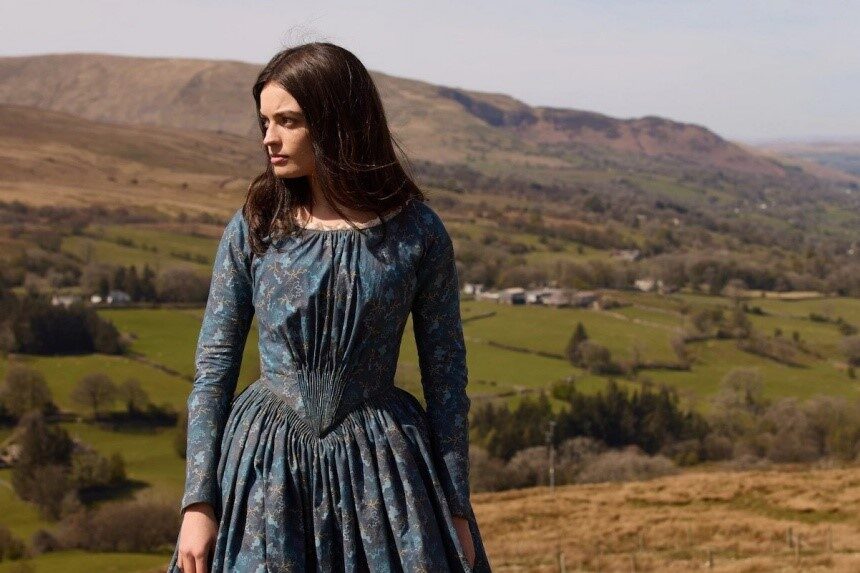Emily
⭐️ ⭐️ ⭐️
Rating: R
Run Time: 2 hours 10 minutes
Stars: Emma Mackey, Alexandra Downing, Amelia Gething
Writer/Director: Frances O’Connor
Reviewed at the Toronto International Film Festival
Film biographies are most fun when precious little is actually known about the person in question, and so their story can be origamied into just about any shape the filmmaker desires.
That’s much of the appeal of Emily, the largely imagined story of 19th century British author Emily Brontë, whose one and only completed novel, Wuthering Heights, remains at or near the top of everyone’s list of the greatest English language novels.
This much is known for sure: Emily, the daughter of a widowed clergyman in Yorkshire, England, was the middle sister of fellow authors Charlotte Brontë (Jane Eyre) and Anne Brontë (The Tenant of Wildfell Hall). As with her sisters, Emily’s prose and poetry were published under male pseudonyms, to considerable public acclaim. She died at age 30, leaving behind an unfinished manuscript that was burned by her older sister.
Not much to hang a movie on, but writer/director Frances O’Connor — an accomplished film actor (A.I.) working behind the camera for the first time — spins a richly textured yarn touching on matters of simmering creativity, sibling rivalry, burning ambition, tragic love, and social rigidity.
It also helps that at the film’s center is a riveting performance by Emma Mackey (Death on the Nile), who plays Emily as a dark-eyed enigma with a devilishly lopsided smile and a proudly displayed rebellious streak — tempered by a painfully desperate yearning for solitude that borders on agoraphobia.
O’Connor’s imagined Brontë family history seems eminently reasonable: We readily accept that Emily, Charlotte (Alexandra Dowling) and Anne (Amelia Gething) — along with their similarly creative brother Patrick (Adrian Dunbar) — developed a fierce rivalry fed by their bullying father’s lifelong efforts to pit them against each other. And we swallow willingly the idea that the sisters would jockey for the inside track when it came to wooing the town’s handsome young preacher (Oliver Jackson-Cohen).
There’s also a nod to the infantilization of 19th century women: Pushing into their 20s, the sisters still feel limited to constructing childish fantasy stories — never written down; only orally narrated and populated by the same characters they created as young children. Only after adult-sized tragedies rip them from the bonds of extended adolescence do they realize there is more to life than ephemeral tales of fairy princesses and their gallant heroes.
When Emma finally puts quill pen to paper, she rolls away the rock that has been concealing a cave of creative darkness. Her novel is virtually devoid of sympathetic characters; the princesses and noblemen of childhood have retreated to the shadows, replaced by abusive aristocrats and joyless spouses. Wuthering Heights, Shakespearian in its raw emotion and fierce inhumanity, in unlike anything being sold in London’s Hatchards book store.
Curiously, O’Connor takes a narrative shortcut that undermines just how revolutionary the Brontës were: In this telling, when Wuthering Heights is published to nearly universal acclaim, Emily’s name appears boldly on the cover. But it’s no secret that Emily wrote under a pseudonym (Ellis Bell), as did Charlotte (Currier Bell) and Anne (Acton Bell) — adopting gender-ambiguous names that readers would safely, under the social circumstances, assume were those of men.
It’s a major diversion from literary history, but just a minor distraction in a lovingly crafted tribute to a singular figure.
In any case, any historical transgressions committed by O’Connor are quickly forgiven thanks to one absolutely harrowing scene early on, when the Brontë sisters and a few friends sit at a parlor table, passing around a mask that once belonged to the sisters’ late mother. It’s all fun and games as each one tries on the mask — until Emily’s turn, when an eerie stillness falls upon the candlelit room.
From behind the mask, Emily begins to speak in the voice of her dead mother. Deliberately, she turns to each of her sisters, intoning supposed messages from beyond the grave. The camera shoots from face to face — terror growing in each one. A storm blows the shuttered windows open. The women’s voices scream into the wind, begging the strangely unmoved Emily to remove the mask.
For those harrowing moments, Emily shifts from a Victorian costume drama to something akin to a Stephen King novel — a whiplash-inducing course change that reminds us how this outwardly conventional family was about to radically redirect the currents of English literature.
Become a Saturday Evening Post member and enjoy unlimited access. Subscribe now



